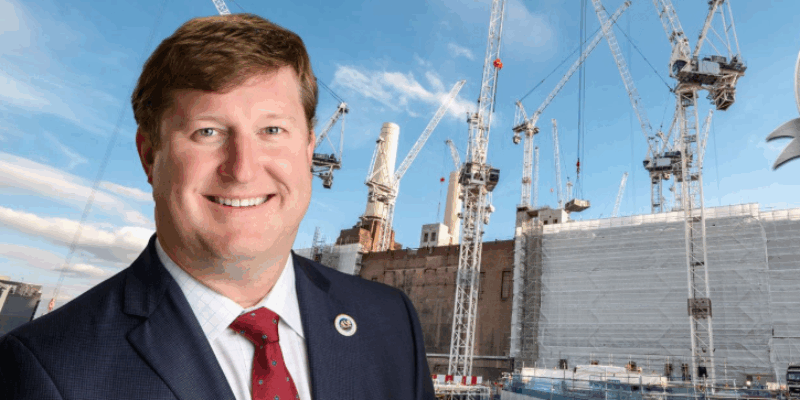(Citizens for a New Louisiana) — One of the core principles of the Conservative and Libertarian movements is that government needs to get out of the way of commerce. We’ve seen how they handle growth in Gavin Newsom’s California: rationing and quotas. One of the best examples of Newsom’s misguided state policies was California’s now-infamous Delta Smelt fiasco, which prioritized the needs of a tiny fish over those of farmers and families.
Lately, the Meta data center has stirred chatter across Louisiana. Much of it has focused on stoking fear—namely, that electricity rates would spike. However, unlike California (well, at least since JBE’s exit from the governor’s mansion), Louisiana has been hyper-focused on getting its economy roaring and its people back to work.
PSC Drama Fizzles with Pro-Growth Win
We haven’t covered the PSC much since Craig “Greene New Deal” decided not to seek re-election (you’re welcome). It’s mostly boring news, bogged down in procedure and obscure policy decisions. However, when Jean-Paul Coussan stepped into the role, he flipped the tenuous 3:2 Republican majority (in name only) to solidly Republican. Once he was seated, the board’s leadership changed from the Democratic Party’s Foster Campbell to the Republican Party’s Mike Francis. Now that we have pro-market Republicans in charge, the need for constant monitoring has finally diminished.
At the same time, our old friend Commissioner Devante Lewis took the expected hard-Left approach on business growth in Louisiana (that there shouldn’t be any—you know, because “eat the rich” or something). Foster Campbell, perhaps recognizing the deal was already sealed, broke ranks with his usual ‘ride-or-die’ Democrat ally and supported the project, resulting in a 4–1 approval.
That leaves just Commissioner Eric Skrmetta, a well-known Louisiana conservative who also voted in favor of the Meta project. Skrmetta, who recently announced his candidacy for the U.S. Senate, has long positioned himself as a reliable pro-economic growth conservative. His vote on this high-profile project may be one of his final major PSC decisions before shifting his attention to the statewide race.
Commissioner Jean-Paul Coussan and The Case for Meta
After the approval, Jean-Paul Coussan issued this statement to reassure ratepayers that their trust has been well placed:
Today, as the District 2 Public Service Commissioner, I voted yes to approve generation and transmission projects in North Louisiana to support a historic project. META is building the world’s largest data center in Richland Parish, which Entergy will power.
Economic Impact
Meta is spending $10 billion on the data center, which will support 5,000 construction jobs and 500 operational jobs once completed. Generation and transmission construction support will add another 1,500 construction jobs and 45 permanent positions. Overall, facility construction is expected to pay out several hundred million dollars in wages to Louisiana residents. Once complete, the facilities are expected to add about $40 million to the state’s economy and about $50 million in state sales tax revenue from construction. Meta is spending more than $200 million on local infrastructure improvements such as roads and water facilities.
What does this mean for rate payers?
I understand the fear my constituents and all Entergy customers have when they see a project of this scale get approved. Entergy and the Public Service Commission Staff have worked endlessly to secure customer protections that we have never seen before.
Key consumer protections that will minimize ratepayer impact were embedded in Meta’s agreement. For instance, Meta will pay an above-industrial standard minimum bill that, when fully realized over the first four years, will generate nearly $500 million to be used to offset transmission costs and further reduce the overall rate impact. Meta will begin paying its bill before any energy is consumed. Meta will be responsible for 100% of the cost to extend electrical facilities to the data center and was guaranteed 15 years of minimum payments, which defrays about 50% of the new generation costs. Meta will also pay the same fuel rates and storm charges as other customers, including contributions to both past and future storm recovery efforts, which will reduce the current storm charge to customers by about 10%. Similarly, Meta will contribute to the resiliency plan, reducing the resilience charge to customers by about 10%. Meta will be required to pay a significant penalty if it backs out of the agreement early.
All construction costs are subject to prudence reviews, and any costs that are determined to be imprudent will not be recoverable through rates charged to customers. Entergy must provide regular updates on construction and costs, as well as Meta’s usage. Additionally, Meta will be required to fund any upgrades needed if its operations cause power quality problems. Critically, the earliest potential rate impact to customers will not occur until 2029, and, based on modeling for the 15-year life of the project, customers can expect to see year-to-year fluctuations of $0.89 to $1.56 by 2030.
The generation and transmission projects were needed in Louisiana regardless of Meta; with this deal, along with immense economic benefits, customers are receiving these much-needed upgrades at half the cost. This settlement marks a historic economic opportunity for Louisiana and specifically North Louisiana, while making sure our citizens come first and are protected. We have made sure the META project benefits all, and Entergy customers do not shoulder the costs.
The Bigger Picture
Remember, Meta may be headquartered in California, but they chose to build here. While nothing is guaranteed, Louisiana must take smart risks if we hope to climb out of last place on the opportunity index. This is the kind of high-profile public decision Louisiana needs to capture the attention of more industry giants looking for a friendly state.
Based on Jean-Paul Coussan’s public statement, it’s evident that the Public Service Commission has turned a corner. No longer are they a Democratic Party-controlled inhibitor of commerce. Now, they’re actively addressing the primary concerns of ratepayers while also successfully charting a course to encourage more businesses to invest in Louisiana.
Advertisement
Advertisement

